‘I don’t want children’- A challenge to the core belief that we should have kids. Not wanting kids does not make you a bad or self-obsessed person.
Firstly, I want to be clear about something. When it comes to having children, I am neutral. I have no particular feelings about having, or not having, a child in this period of my life. I remain in the middle ground. I am on the fence. I am in Switzerland. The truth is that I don’t really know what I want at this point in my life. So I will leave it at that, and see where the tide pulls me.
But what about other men and women? What about the desire to remain childless as opposed to having a typical nuclear family?
When someone tells you that they don’t want children what is your first reaction?
If you are like most people you will associate the desire to not have children in women as a sign of selfishness, self-absorption, or lack of desirability – same with men (but perhaps less so). If you are like most people you will think of childless women as “spinsters” or “yuppies” and childless men as “playboys” or “infertiles.”
Related: Sons Of Narcissistic Mothers and The Damage They Suffer
In fact, our beliefs surrounding conceiving and rearing children seem to be very warped and imbalanced. We seem to carry this deep-rooted conviction that life is about getting a job, getting married, having kids, working until the age of 60, and retiring. We seem to still be stuck in a 1950’s mindset of how life is “meant” to be.
We seem to believe that the desire to not have children is somehow narcissistic, unnatural, and miserly.
It’s about time that we challenge the belief that adult life is inevitably about raising a hoard of children. We need to explore the other side of the equation.
Don’t Feel The Need To Have Children – The Choice Is Yours (If You Let It Be)
All throughout our lives we experience immense, but often subtle forms, of pressure. We face the pressure of being fashionable, we face the pressure of being liked by others, we face the pressure of getting a good job and education, we face the pressure of living up to our parent’s expectations, and we face the pressure of remaining young and beautiful … and unsurprisingly, we face the pressure to fit our lives into the mold that society tells us is “acceptable” and “normal.”
This, irrevocably, includes having children.
In fact, from a very young age, we are brainwashed to accept that raising children is our fate as adults. We see this belief reflected all around us: in newspapers, in movies, in TV shows, in books, in magazines, and in our everyday lives; in our friends, family members, relatives, and business partners.
We are constantly asked, “When are you going to have children?” by our friends and acquaintances, and we are asked by our parents, “When will you give me grandchildren?” As we age, the crushing weight of people’s expectations and demands for us to have children increase as our bodies mature. Women especially face overwhelming stress as the burden of “having to have a child” increases as their biological clocks begin to wind down.
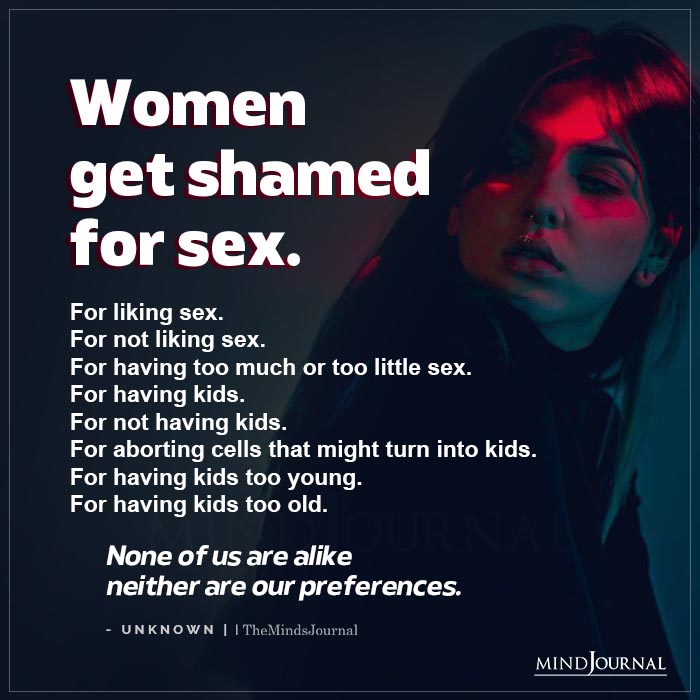
All in all, we carry around the crushing weight of an outdated idea that, for some people, results in a lot of regrets and financial hardship.
This is not to say that having a child is a bad thing. In fact, for many people having a child is the genuine, heart-felt highlight of life. This is perfectly fine as well.
On one side of the equation, people want to have children to:
- Fulfill their desire to nurture.
- Continue on the family name.
- Find meaning in life.
- Have companionship.
- Have someone to pass on life’s treasures after death.
- Live vicariously (through their joys and accomplishments).
- Not wanting to die alone.
However, on the other side of the equation, people who say they don’t want to have children, they say that because of:
- Moral concerns, such as the desire not to bring a child into a world full of cruelties.
- Overpopulation.
- Financial pressure.
- Financial and personal freedom.
- The belief of not being a suitable or well-equipped parent.
- Poor genetics (such as having physical or psychological illnesses).
- Having already found meaning and fulfillment in life.
As we can see, both sides of the equation are legitimate. And both sides have equally noble and ignoble reasons supporting them.
But why do we still have such a black and white perspective of not wanting to have children?
Related: 20 Brutally Honest Things Women Turning 40 Want All Women In Their 30s To Know
Why You Don’t Want Children? 4 Myths And Assumptions
I believe the reason why we have such an ignorant and one-sided understanding of those who don’t want to have children is that we carry a set of myths and assumptions that muddy our ability to empathize with childless people.
Let’s explore them:
Myth 1 – Children will bring you fulfillment.
Children bring many gifts to our lives, there is no denying that, but to believe that children will bring us fulfillment is misguided. While children might bring us a lot of happiness, they don’t always bring us fulfillment.
The truth is that true, deep, and long-lasting fulfillment is something that is cultivated within, and the desire to bring fulfillment into your life by having a child is not only unreasonable but unfair on the child as well.
Mindful parenting can help you raise children without stress.
Myth 2 – If you have a child, you will never be alone.
Many people have children out of the fear of winding up “alone” during their lifetime and on their deathbed. In fact, it is common in our society to be pushed into having children to avoid this very primal fear.
The truth is that children are human beings, and human beings are unpredictable. We wear rose-tinted glasses when it comes to having kids, but the reality is that we don’t know whether we will be estranged from them in the future, or whether they will truly be there for us, no matter how we raise them.
Also, having a child to avoid being alone is not only an immense burden on the child but a form of escapism from self-responsibility. Many parents feel alone, even when they do have children. Why? Because true happiness is cultivated inside, not on outside things (such as children) which are unpredictable and transient. When we look for joy outside of ourselves we will always feel miserable sooner or later when these things are taken away from us.
Myth 3 – Not wanting to have a child makes you selfish.
As we have seen, many people have children for completely selfish reasons (not wanting to die alone, wanting to find fulfillment, wanting to be liked and accepted by friends and family) – and the same goes for people who don’t want children. There can be selfish motivations on both sides of the spectrum.
But the truth is that not wanting to have a child is so much more than just “being selfish.” As we saw above, not wanting to have kids also involves deeper matters such as the desire to not contribute to overpopulation, poor/dangerous genetics, not wanting to be a bad parent, and so forth.

Myth 4 – Women who don’t want children are not feminine.
Women especially cop a lot of criticism and judgment when it comes to not wanting children. They are seen as superficial, egotistic, uncaring, unloving, cold, and sexually stale.
If not pinned with these nasty labels, women who don’t want children are also brushed off, seen as immature, or told “You’ll grow out of it. You want children, you just don’t know it yet.”
The truth, although hard to swallow for many people, is that many women just don’t have the desire to have children. Some have maternal instincts, others don’t, but the desire to nurture doesn’t always need to be expressed through child-rearing. Often childless women are compassionate volunteers, caring pet owners, loving friends, or passionate artists – tasks that all require nursing and mothering to different extents.
Related: 14 Helpful Tips for Single Parents: How to Stay Sane While Doing it All
As author Gloria Steinem famously stated:
“Everyone with a womb doesn’t have to have a child any more than everybody with vocal chords has to be an opera singer.”
Womanliness does not need to be defined by having children any more than manliness doesn’t need to be defined by having big muscles.
We are raised making many assumptions that often go unchallenged in life. These assumptions often result in unnecessary and harmful stereotypes, ideals, beliefs, and pressures that are placed on us all throughout our lives.
If you keep telling people “I don’t want children” good on you, I say. Your life is your making. It doesn’t need to be defined by other people’s expectations.
What have your experiences been with having children, or remaining childless?
Written By Aletheia Luna Originally appeared on Loner Wolf
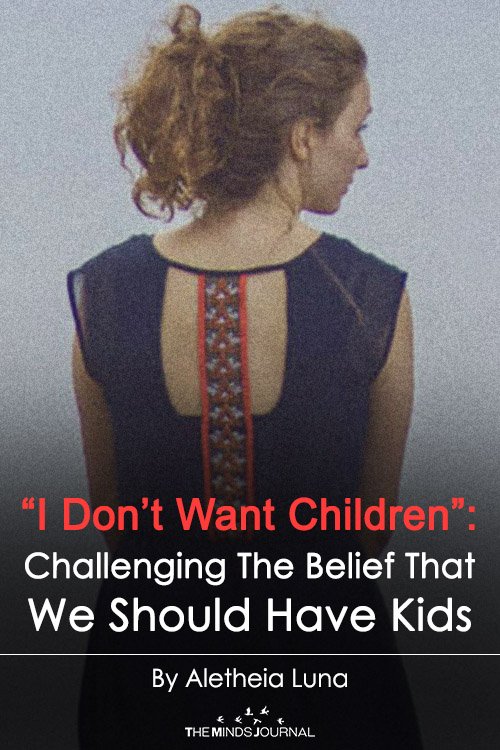
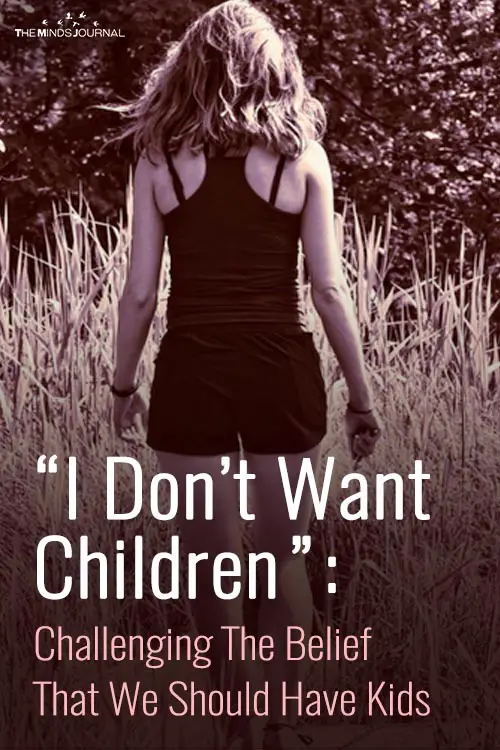
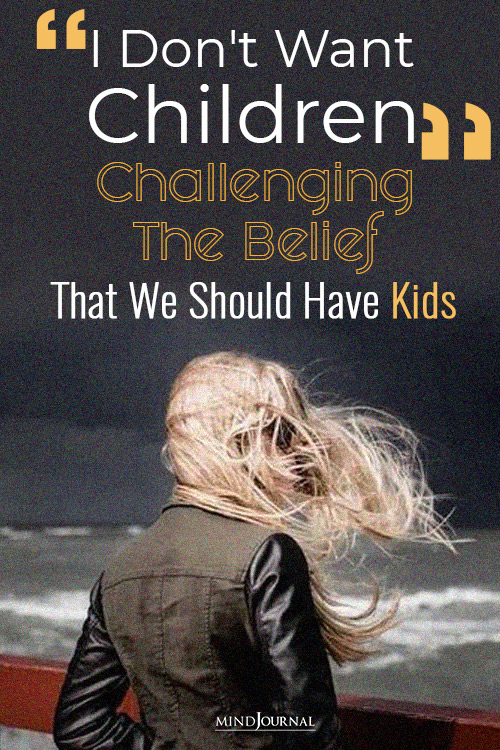
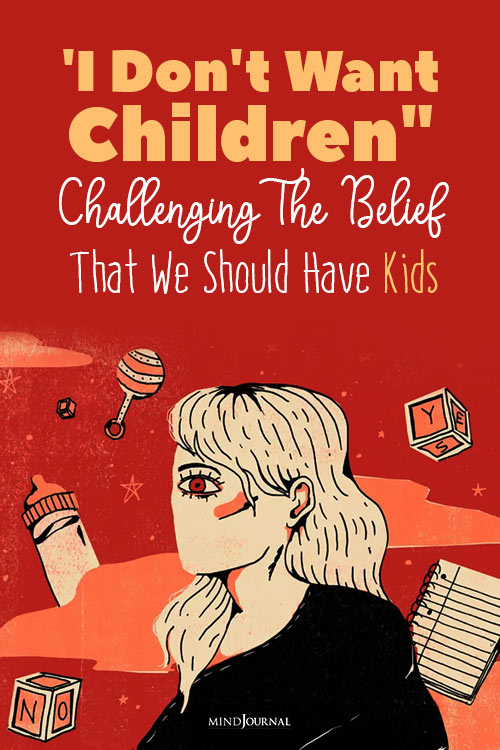
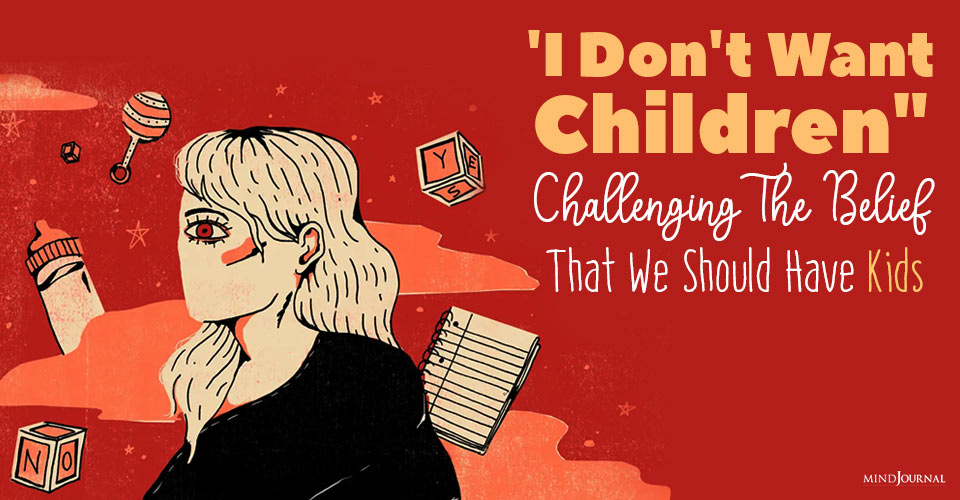







Leave a Reply
You must be logged in to post a comment.